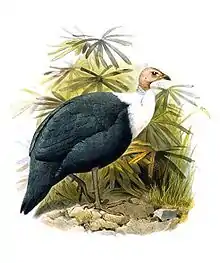| White-breasted guineafowl | |
|---|---|
 | |
| Scientific classification | |
| Domain: | Eukaryota |
| Kingdom: | Animalia |
| Phylum: | Chordata |
| Class: | Aves |
| Order: | Galliformes |
| Family: | Numididae |
| Genus: | Agelastes |
| Species: | A. meleagrides |
| Binomial name | |
| Agelastes meleagrides Bonaparte, 1850 | |
The white-breasted guineafowl (Agelastes meleagrides) is a medium-sized, up to 45 cm long, terrestrial bird of the guineafowl family.
Description
It has a black plumage with a small, bare, red head, white breast, long, black tail, greenish-brown bill, and greyish feet. The sexes are similar, although the female is slightly smaller than the male.
Distribution
The white-breasted guineafowl is distributed in subtropical West African forests of Côte d'Ivoire, Ghana, Guinea, Liberia, and Sierra Leone. Although preferring a more dry climate, the species prioritizes forest coverage causing the distribution of the species to have a much broader distribution.
Diet
Its diet consists mainly of seeds, berries, termites, and small animals.
Conservation
Due to ongoing habitat loss and hunting in some areas, the white-breasted guineafowl is rated as vulnerable on the IUCN Red List.
References
- ↑ BirdLife International (2016). "Agelastes meleagrides". IUCN Red List of Threatened Species. 2016: e.T22679545A92818303. doi:10.2305/IUCN.UK.2016-3.RLTS.T22679545A92818303.en. Retrieved 12 November 2021.
Freeman, B., Jiménez-García, D., Barca, B., & Grainger, M. (2019)[1]
WALTERT, M., SEIFERT, C., RADL, G., & HOPPE-DOMINIK, B. (2010)[2]
External links
- ↑ Freeman, B., Jiménez-García, D., Barca, B., & Grainger, M. (2019). Using remotely sensed and climate data to predict the current and potential future geographic distribution of a bird at multiple scales: The case of agelastes meleagrides, a western african forest endemic. Avian Research, 10(1), 1-9. https://doi.org/10.1186/s40657-019-0160-y
- ↑ WALTERT, M., SEIFERT, C., RADL, G., & HOPPE-DOMINIK, B. (2010). Population size and habitat of the white-breasted guineafowl agelastes meleagrides in the taï region, côte d'ivoire. Bird Conservation International; Bird Conservation International, 20(1), 74-83. https://doi.org/10.1017/S0959270909990189
